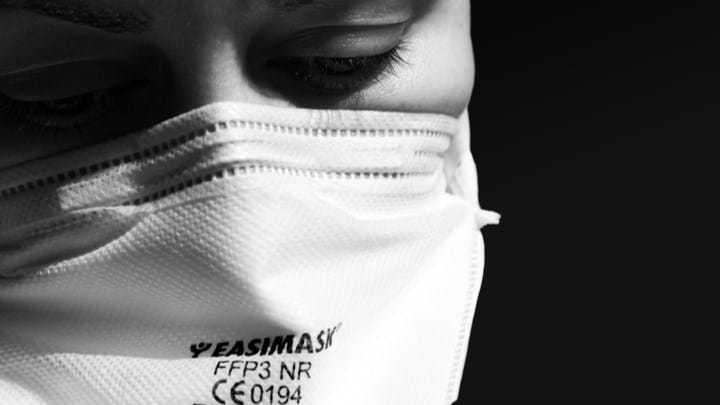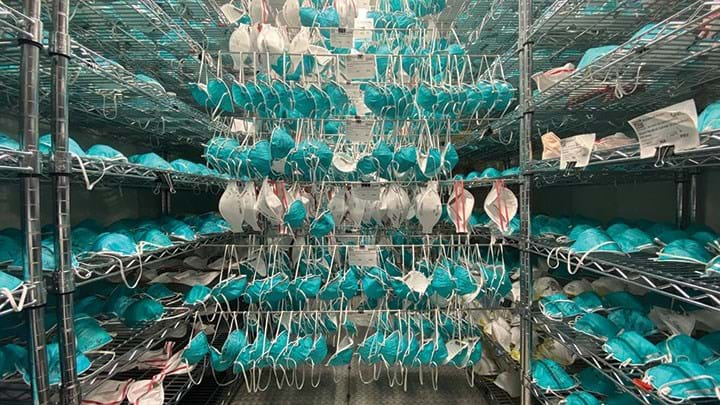Engineers tell government how PPE could be reused in the UK

SERIOUS consideration should be given to decontaminating and reusing PPE to alleviate shortages and improve sustainability, according to a briefing paper that the UK Government requested from engineers.
The paper was submitted to Government by the UK’s National Engineering Policy Centre (NEPC) with input from expert members of IChemE. The briefing follows the Government’s publication of a PPE strategy for England, which outlines how the UK has increased domestic manufacture of PPE from meeting just 1% of demand before the pandemic to the 70% of demand that it estimates will be achieved by December.
The strategy, which the Government published at the end of September, noted that the National Health Service (NHS) is interested in pursuing the reuse strategies that other countries have adopted to increase their resilience to PPE shortages. While more than 2bn items of PPE have been delivered to health and social workers in England between March and July, shortages have been reported. Now the health service faces increasing pressure from rising Covid-19 infections and the winter flu season.
The potential decontamination methods outlined by engineers have been studied and trialled in the US, China, Finland, Japan and Germany, including treatment with hydrogen peroxide vapour, ultraviolet light, moist heat, dry heat and irradiation.
The paper offers a series of recommendations for how the Government could pursue the sanitising of used PPE, if regulators including the Health and Safety Executive (HSE) change their guidance and recommend reuse.
Nick Geary, a member of the IChemE Covid-19 Response Team said: “On such a critical issue, my colleagues in the IChemE Covid-19 Response Team and I were delighted to be able to assist the Royal Academy of Engineering with their submission to the UK Government through the NEPC. Recognising that the development, scaleup and application of the processes needed to implement PPE decontamination requires the specialist knowledge of chemical engineers, biochemical engineers and process engineers, we were pleased to be able provide the expertise necessary and look forward to working with the team in the future.
“Understanding the benefits of decontaminating PPE from a volume, cost and sustainability perspective, this programme could help to drive a revolution from single-use to multi-use PPE. This epitomises IChemE’s vision to serve society on a worldwide scale, both technically and practically.”
Guidance given
In the briefing report, engineers say the method of decontamination chosen would determine which items of PPE were applicable, necessary validations, potential risks and how many times the PPE could be reprocessed. Adopting a standardised approach across the UK would be beneficial.
They advise that the NHS lead the development of any processing facilities while consulting with experts. This will ensure all the component parts, including reprocessing equipment, personal containers, and the provision of skilled personnel, can scale simultaneously to meet potential demand.

Quality management records for any decontamination methods adopted would be critical to ensure good practice, traceability, and auditability alongside robust health and safety protocols to assess and manage risk assessments. Rigorous validation and verification would be required of any approach to the reprocessing of single-use PPE to ensure that the PPE decontamination process was effective and did not introduce other risks. This would include assessments to ensure the elimination of the virus and other micro-organisms, quantitative fit tests and performance tests. Any soiled or damaged PPE must be disposed of appropriately, and reprocessed PPE must be tracked to ensure that reuse does not exceed the recommended number of cycles.
Healthcare professionals would need to be consulted to ensure that the risks of reprocessing PPE are fully understood, and any process deployed should be validated locally but remain under review as scientific evidence continues to emerge.
“The key takeaway for the chemical engineering community is there is an engineering solution to the PPE shortage,” Geary said, though noted that engineers should be called on to do more.
Focussed brief
In May, volunteers from the IChemE Covid-19 Response Team in partnership with the International Society for Pharmaceutical Engineers UK Affiliate (ISPE UK) announced they had been working with specialist consultants, equipment vendors and facility design companies to support several projects on the decontamination of PPE including demonstrating technical feasibility.
Concerns have been raised by members of the IChemE Covid-19 Response Team that the Government briefing paper focuses too much on overseas solutions. Responding to these concerns, Geary said the Government requested a literature review so the report from engineers could only focus on documented and applied technologies, which currently only exist outside the UK.
In light of the work undertook by IChemE volunteers and industrial collaborators, Geary said he is convinced a consortium of UK-based companies could deliver a “technically superior and a more custom solution for UK hospitals and care homes”.
Geary noted that the design that volunteers had helped support would work with UK hospital equipment so would reduce lead time and cost. Furthermore, the system would make use of a novel enzyme-based indicator that would reduce validation times; its implementation would be supported by local companies that could provide technical support and assistance with operations; and it is designed to meet UK regulations, which overseas systems are not.
Geary says the report is a success because it helps build bridges between engineers and the decision-makers in Government but he is concerned it does not go far enough.
“A missed opportunity is we weren’t able to draw upon the expertise of UK companies to the extent we could have,” Geary said. “While the Dunkirk spirit was alive and well amongst IChemE, ISPE and the partner companies – the bridge to the decision-makers was not as fruitful as it might have been.”
"While a necessary first step, it's not sufficient. At times like these, our engineers should be called upon to do, and not just consult.”
Environmental concerns
David Delpy, a Fellow of the Royal Academy of Engineering, said: “We welcome the Government’s PPE strategy, which outlines how it aims to move away from disposable-by-default and assess new types of PPE that are designed for reuse from the outset. Some UK pilot studies are now in progress.
“However, as the pandemic continues, we think there should be more emphasis on decontamination methods, which if properly used could enable more sustainable use of PPE that is specifically designed for reuse and reprocessing. We need to be conscious of the environmental impact of using and disposing of so much plastic waste, particularly when much of it has to be incinerated after use.”
A study on the environmental dangers of single-use masks conducted by researchers at University College London earlier this year estimated that if every person in the UK used one single-use mask each day for a year, that would create 66,000 t of contaminated plastic waste and create ten times more climate change impact than using reusable masks.
Recent Editions
Catch up on the latest news, views and jobs from The Chemical Engineer. Below are the four latest issues. View a wider selection of the archive from within the Magazine section of this site.




